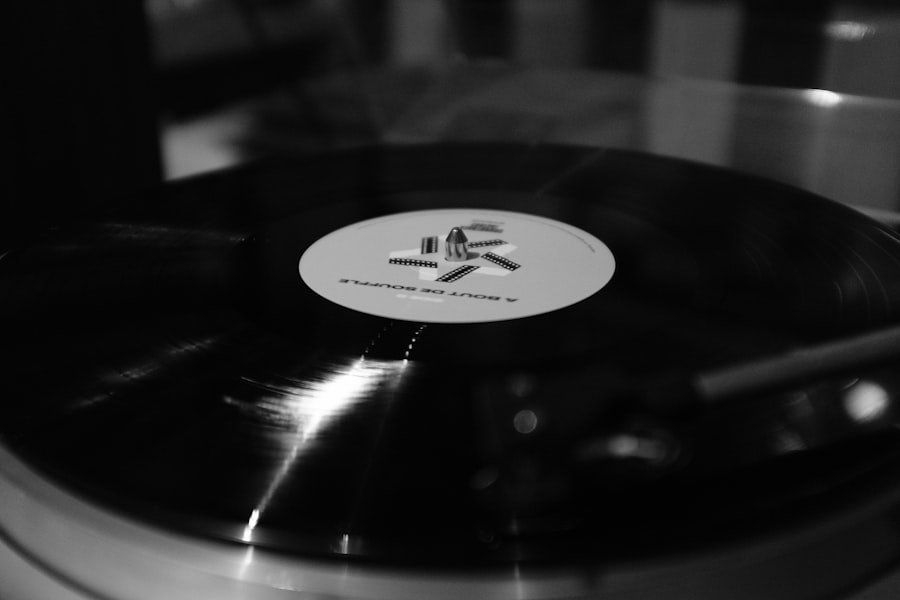How to Start a Vinyl Business (if you own a Cricut or Silhouette)

Vinyl business is a thriving industry that involves the creation and sale of various products made from vinyl material. This versatile material is used to make a wide range of products, including decals, stickers, signs, banners, clothing, and more. Understanding the vinyl business involves knowing the different types of vinyl materials available, their uses, and the market demand for vinyl products. It also involves understanding the various techniques and equipment used in the production of vinyl products, as well as the legal and safety considerations involved in running a vinyl business.
The vinyl business is a dynamic and fast-growing industry that offers a wide range of opportunities for entrepreneurs. With the increasing demand for personalized and custom-made products, the vinyl business has become a popular choice for many individuals looking to start their own business. Understanding the vinyl business also involves knowing the target market for vinyl products, including businesses, organizations, and individuals who are looking for high-quality and customizable vinyl products. Additionally, understanding the competition in the vinyl business is crucial for success, as it allows entrepreneurs to identify their unique selling points and develop strategies to stand out in the market.
Key Takeaways
- The vinyl business involves creating and selling custom vinyl products such as decals, stickers, and signage.
- When choosing equipment for your vinyl business, consider factors such as cutting size, software compatibility, and budget.
- Designing and creating vinyl products requires creativity, attention to detail, and knowledge of different vinyl types and application techniques.
- Setting up your vinyl business involves tasks such as obtaining necessary licenses, setting up a workspace, and sourcing materials and suppliers.
- Marketing and selling your vinyl products can be done through online platforms, local markets, and collaborations with other businesses.
- Managing a vinyl business involves keeping track of inventory, fulfilling orders in a timely manner, and providing excellent customer service.
- Growing your vinyl business can be achieved through expanding product offerings, reaching new customer segments, and building a strong brand presence.
Choosing the Right Equipment
Choosing the right equipment is crucial for starting and running a successful vinyl business. The equipment needed for a vinyl business includes a vinyl cutter, heat press machine, computer with design software, and various other tools and accessories. When choosing equipment for a vinyl business, it’s important to consider the size of the business, the types of products to be produced, and the budget available. Investing in high-quality equipment is essential for producing professional-looking vinyl products and ensuring efficiency in the production process.
The right equipment can make a significant difference in the quality and efficiency of a vinyl business. For example, a high-quality vinyl cutter with precision cutting capabilities can ensure clean and accurate cuts for decals and stickers. Similarly, a reliable heat press machine is essential for applying heat transfer vinyl onto various surfaces, such as clothing and bags. It’s also important to consider the compatibility of equipment with design software and other tools used in the production process. Additionally, choosing equipment from reputable manufacturers and suppliers can provide assurance of reliability and after-sales support, which is crucial for the smooth operation of a vinyl business.
Designing and Creating Vinyl Products
Designing and creating vinyl products is a creative process that involves using design software to create custom designs, cutting vinyl material using a vinyl cutter, and applying the designs onto various surfaces using a heat press machine or other application methods. The design aspect of creating vinyl products is crucial for producing unique and eye-catching designs that appeal to the target market. It involves understanding design principles, color theory, typography, and other elements of visual communication to create impactful designs.
Creating vinyl products also involves mastering the techniques of cutting and applying vinyl material onto different surfaces. This includes understanding the properties of different types of vinyl material, such as adhesive vinyl, heat transfer vinyl, and printable vinyl, and knowing how to work with them effectively. It also involves mastering the use of a heat press machine or other application methods to ensure proper adhesion of vinyl designs onto surfaces. Additionally, creating vinyl products may involve experimenting with different techniques, such as layering vinyl colors, using special effects vinyl, and incorporating other embellishments to enhance the visual appeal of the products.
Setting Up Your Business
Setting up a vinyl business involves several key steps, including creating a business plan, registering the business, obtaining necessary permits and licenses, setting up a workspace, sourcing materials and supplies, and establishing a pricing strategy. A well-thought-out business plan is essential for outlining the goals, target market, marketing strategies, financial projections, and other important aspects of the business. Registering the business with the appropriate authorities and obtaining necessary permits and licenses are crucial for legal compliance and credibility.
Setting up a workspace for a vinyl business involves creating a clean and organized environment for designing, cutting, weeding, and applying vinyl material. This may involve setting up worktables, storage for materials and supplies, and investing in proper lighting and ventilation for a comfortable working environment. Sourcing high-quality materials and supplies from reliable suppliers is essential for producing top-notch vinyl products. Establishing a pricing strategy involves considering factors such as material costs, production time, overhead expenses, market demand, and competition to determine competitive yet profitable pricing for products.
Marketing and Selling Your Products
Marketing and selling vinyl products involve creating a strong brand identity, developing an online presence through a website and social media platforms, networking with potential clients and collaborators, participating in trade shows and events, and implementing effective sales strategies. Building a strong brand identity involves creating a memorable logo, defining the brand’s values and mission, and developing a cohesive visual language for marketing materials and products. A professional website and active presence on social media platforms are essential for reaching potential customers and showcasing products.
Networking with potential clients and collaborators can open up opportunities for partnerships, collaborations, and custom orders. This may involve reaching out to businesses, organizations, event planners, and individuals who may be interested in purchasing custom-made vinyl products. Participating in trade shows and events related to the target market can provide exposure and networking opportunities to showcase products and connect with potential customers. Implementing effective sales strategies may involve offering promotions, discounts, or special packages to attract new customers and retain existing ones.
Managing Your Vinyl Business

Managing a vinyl business involves overseeing day-to-day operations, managing inventory and supplies, fulfilling orders in a timely manner, providing excellent customer service, tracking finances and expenses, and continuously improving processes for efficiency and quality. Overseeing day-to-day operations may involve managing production schedules, coordinating with suppliers, communicating with customers, and ensuring that all aspects of the business are running smoothly. Managing inventory and supplies is crucial for maintaining adequate stock of materials needed for production.
Fulfilling orders in a timely manner is essential for customer satisfaction and building a positive reputation for the business. Providing excellent customer service involves addressing customer inquiries promptly, handling returns or issues professionally, and going above and beyond to ensure customer satisfaction. Tracking finances and expenses is important for maintaining financial stability and making informed decisions for the business. Continuously improving processes for efficiency and quality may involve investing in new equipment or tools, refining production techniques, or seeking feedback from customers to identify areas for improvement.
Growing Your Vinyl Business
Growing a vinyl business involves expanding product offerings, reaching new markets or customer segments, hiring additional staff or outsourcing tasks as needed, investing in marketing efforts to increase brand visibility, and seeking opportunities for collaborations or partnerships with other businesses or organizations. Expanding product offerings may involve introducing new designs, product lines, or customization options to cater to evolving customer preferences. Reaching new markets or customer segments may involve targeting specific industries or demographics that have a demand for custom-made vinyl products.
Hiring additional staff or outsourcing tasks can help alleviate workload as the business grows. This may involve hiring designers, production assistants, or administrative staff to support various aspects of the business. Investing in marketing efforts to increase brand visibility can help attract new customers and retain existing ones. This may involve running targeted advertising campaigns online or offline, collaborating with influencers or bloggers in related niches, or seeking press coverage to generate buzz around the brand. Seeking opportunities for collaborations or partnerships with other businesses or organizations can open up new avenues for exposure and sales through joint promotions or co-branded products.
If you’re looking to expand your vinyl business and take it to the next level, you might want to check out this insightful article on how to optimize your designs for cutting machines like Cricut or Silhouette. This article from HowToStart.digital provides valuable tips and techniques for creating designs that work seamlessly with these popular cutting machines, helping you streamline your production process and deliver high-quality products to your customers. Whether you’re a seasoned vinyl business owner or just starting out, this article is a must-read for anyone looking to harness the full potential of their cutting machine.
FAQs
What is a vinyl business?
A vinyl business involves creating and selling vinyl products such as decals, stickers, signs, and other customized items using a vinyl cutting machine like Cricut or Silhouette.
What do I need to start a vinyl business?
To start a vinyl business, you will need a vinyl cutting machine (such as Cricut or Silhouette), vinyl material in various colors, a computer with design software, a heat press or iron for heat transfer vinyl, and packaging materials for shipping products.
Do I need a business license to start a vinyl business?
It is recommended to check with your local government or small business administration to determine if you need a business license to operate a vinyl business in your area.
How can I market my vinyl business?
You can market your vinyl business through social media platforms, creating a website or online store, attending craft fairs or markets, collaborating with other small businesses, and offering promotions or discounts to attract customers.
What are some popular products to sell in a vinyl business?
Popular products to sell in a vinyl business include custom decals for cars, laptops, and water bottles, personalized t-shirts and apparel, home decor items such as wall decals and signs, and custom gifts such as mugs and tumblers.




